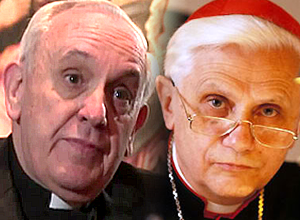 What do you think of the following statement?
What do you think of the following statement?
OPE FRANCIS HAS a group of eight cardinals to help him manage the Church, whereas Pope Benedict XVI was able to govern the Church all by himself. This proves Benedict was better at being Pope than Francis.
Wow! I just “proved” Benedict was better at being Pope, right? There’s just one problem: I used piccoluomini logic.
Another example would be the pronunciation of FEBRUARY. It has an “R” in it, so that’s automatically the correct & only pronunciation, right? Nope.

THIS FALSE TYPE OF LOGIC, called piccoluomini logic, is more prevalent than one might expect. Let’s examine some common examples:
1. The minor orders have undergone development over the centuries and no longer seem identical to what they were in earlier centuries … therefore they are “meaningless” and have “no reason for their existence.”
2. Having the blessing after the dismissal (as in the Extraordinary Form) doesn’t make “sense,” so this needs to be “corrected,” in spite of the clear history of how these actions developed.
3. The Eastern Rites “all have several anaphoras,” so the Roman Rite prior to 1969 was “deficient” since it had only the Roman Canon. Furthermore, the Roman Canon is so ancient, parts of it are difficult to understand, so these are “defects.”
4. Full, active participation does not mean prayerfully listening to something at Mass (e.g. the choir singing the Communion Antiphon), it means doing or saying something.
5. Proclaiming the readings in Latin would be absurd, because not everyone in the congregation understands Latin. If Scripture is read in the vernacular, everyone can fully understand Scripture (in spite of 2 Pet 3:16).
6. Reception of Holy Communion in the hand might be more ancient than reception on the tongue (although this is impossible to prove). Therefore, Communion in the hand is better.
7. The Ordinary Form has three cycles of readings, therefore it’s better than the Extraordinary Form, which has only one cycle. More Scripture is de facto better.
All these statements make heavy use of piccoluomini logic. Although false, such ideas have reigned supreme for decades, and most were taken from a book published in 1983 by one of the chief liturgical reformers. However, the internet is helping to change the situation. People are starting to “wake up.”
For example, if Number 7 were true, then why not six cycles? Or nine cycles? As a matter of fact, the 3-year Lectionary has been a failure (compared to the traditional 1-year cycle) because human beings are “geared” toward annual events. Our minds, emotions, and memories simply aren’t programmed for a 3-year cycle. It turns out there’s a reason the 1-year cycle lasted so many centuries. Or, consider Number 4. If that were true, then nobody but the priest “participates” during the sermon, right?
I won’t examine each falsehood, but Number 5 is kind of interesting. The fact is, Scripture readings during Mass are not just didactic, although the Council of Trent (XII:8) seemed to imply they are to a certain degree. The readings at Mass are a prayer, yet so few people seem to understand this. Even some “traditionalists” seem embarrassed the EF readings are in Latin.

FOR THOSE WHO ARE NOT obsessed with reading about the Liturgy, the word “piccoluomini” (a.k.a. piccolomini) means “little men.” This term normally refers to those who harmed the liturgy after the Council: the unqualified meddlers who gave us translations like this and wrongly refer to empty seminaries, dying convents, mass apostasy, and rampant heresy as “renewal.”
I’ve written too much, so I should end this article … but incidentally which is the better Pope: Benedict or Francis? Only God can judge, since each has strengths and weaknesses. However, I am willing to point out what Benedict XVI gave us — a truly wonderful gift — Summorum Pontificum. Never again can those who love Catholic traditions be accused of being “old fashioned.” Remember, Summorum is dated 7 July 2007 … not 1907. Furthermore, it was accompanied by powerful quotes like this:
What earlier generations held as sacred remains sacred and great for us, too, and cannot be all of a sudden entirely forbidden or even considered harmful. It behooves all of us to preserve the riches which have developed in the Church’s faith and prayer, and to give them their proper place.
After all, the post-Conciliar Reforms went beyond what the Council had ordered. Pope Paul VI should have learned from Pope Pius V, who allowed liturgical traditions “more than 200 years old” to continue, in spite of his promulgation of a new edition of the Roman Missal. I’ve decided to say a very short prayer every night, in thanksgiving for Summorum Pontificum. I hope you’ll join me!

